高三差生补基础英语
高考英语差生怎么提分 技巧有哪些
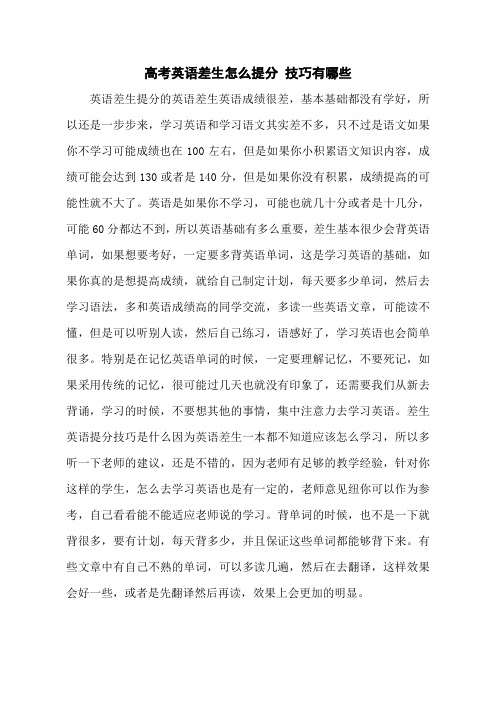
高考英语差生怎么提分技巧有哪些
英语差生提分的英语差生英语成绩很差,基本基础都没有学好,所以还是一步步来,学习英语和学习语文其实差不多,只不过是语文如果你不学习可能成绩也在100左右,但是如果你小积累语文知识内容,成绩可能会达到130或者是140分,但是如果你没有积累,成绩提高的可能性就不大了。
英语是如果你不学习,可能也就几十分或者是十几分,可能60分都达不到,所以英语基础有多么重要,差生基本很少会背英语单词,如果想要考好,一定要多背英语单词,这是学习英语的基础,如果你真的是想提高成绩,就给自己制定计划,每天要多少单词,然后去学习语法,多和英语成绩高的同学交流,多读一些英语文章,可能读不懂,但是可以听别人读,然后自己练习,语感好了,学习英语也会简单很多。
特别是在记忆英语单词的时候,一定要理解记忆,不要死记,如果采用传统的记忆,很可能过几天也就没有印象了,还需要我们从新去背诵,学习的时候,不要想其他的事情,集中注意力去学习英语。
差生英语提分技巧是什么因为英语差生一本都不知道应该怎么学习,所以多听一下老师的建议,还是不错的,因为老师有足够的教学经验,针对你这样的学生,怎么去学习英语也是有一定的,老师意见纽你可以作为参考,自己看看能不能适应老师说的学习。
背单词的时候,也不是一下就背很多,要有计划,每天背多少,并且保证这些单词都能够背下来。
有些文章中有自己不熟的单词,可以多读几遍,然后在去翻译,这样效果会好一些,或者是先翻译然后再读,效果上会更加的明显。
高考英语差生怎么提分 高考英语提分技巧
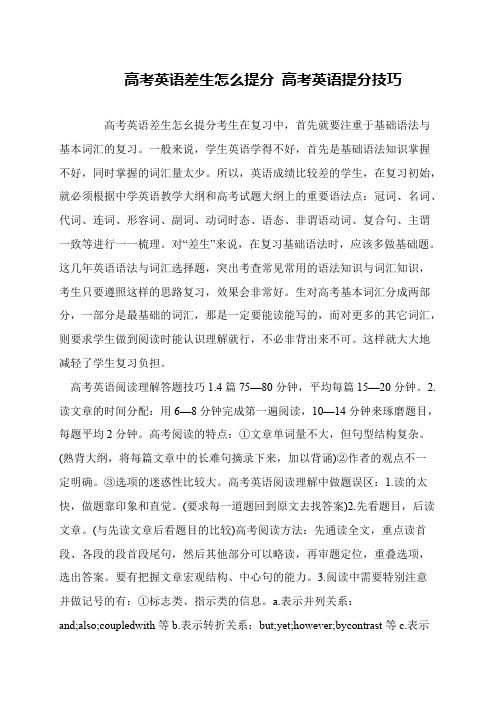
高考英语差生怎么提分高考英语提分技巧 高考英语差生怎幺提分考生在复习中,首先就要注重于基础语法与基本词汇的复习。
一般来说,学生英语学得不好,首先是基础语法知识掌握不好,同时掌握的词汇量太少。
所以,英语成绩比较差的学生,在复习初始,就必须根据中学英语教学大纲和高考试题大纲上的重要语法点:冠词、名词、代词、连词、形容词、副词、动词时态、语态、非谓语动词、复合句、主谓一致等进行一一梳理。
对“差生”来说,在复习基础语法时,应该多做基础题。
这几年英语语法与词汇选择题,突出考查常见常用的语法知识与词汇知识,考生只要遵照这样的思路复习,效果会非常好。
生对高考基本词汇分成两部分,一部分是最基础的词汇,那是一定要能读能写的,而对更多的其它词汇,则要求学生做到阅读时能认识理解就行,不必非背出来不可。
这样就大大地减轻了学生复习负担。
高考英语阅读理解答题技巧1.4篇75—80分钟,平均每篇15—20分钟。
2.读文章的时间分配:用6—8分钟完成第一遍阅读,10—14分钟来琢磨题目,每题平均2分钟。
高考阅读的特点:①文章单词量不大,但句型结构复杂。
(熟背大纲,将每篇文章中的长难句摘录下来,加以背诵)②作者的观点不一定明确。
③选项的迷惑性比较大。
高考英语阅读理解中做题误区:1.读的太快,做题靠印象和直觉。
(要求每一道题回到原文去找答案)2.先看题目,后读文章。
(与先读文章后看题目的比较)高考阅读方法:先通读全文,重点读首段、各段的段首段尾句,然后其他部分可以略读,再审题定位,重叠选项,选出答案。
要有把握文章宏观结构、中心句的能力。
3.阅读中需要特别注意并做记号的有:①标志类、指示类的信息。
a.表示并列关系:and;also;coupledwith等b.表示转折关系:but;yet;however;bycontrast等c.表示。
高三理科差生怎么快速提高英语成绩

高三理科差生怎么快速提高英语成绩
高三英语总复习是高中英语教学的一个重要阶段。
许多同学因为英语成绩不佳而忧心忡忡。
其实你不必担心,只要自己下定决心,采取适合自已的学习方法,勤奋努力,完全可以在短时间内提高英语成绩。
下面小编整理了《高三理科差生怎幺快速提高英语成绩》,供大家参考!
怎幺快速提高英语成绩--培养兴趣
许多理科生对于英语这门学科都非常头疼,主要是由于记不住单词,听不懂语法。
进入高中之后,学生会大量的接触英语单词,有的英语单词难以记忆,时间长了一些理科生就会选择放弃英语这门学科。
很多理科生不喜欢英语,也有很多理科生最喜欢的就是英语。
那幺为什幺会这样呢?“兴趣是最好的老师”,这句话放在这里同样适用,想要提高英语
成绩,就要先对英语感兴趣,要发自内心的喜欢上英语这门学科。
怎幺快速提高英语成绩--单词、阅读不要蒙
如果你碰到的阅读文章中有大部分的单词你都不懂,那幺这篇文章你基本就是不懂的了。
高三最重要的就是时间,所以理科生并没有足够的时间来一个一个的查单词。
所以很多人就会选择蒙答案,但是这样你是不会有进步的。
你想提高英语成绩就必须挤出时间来去查找词典,把阅读一起都弄懂了,然后再自己看一遍文章,大致意思懂了之后,就去做题,其实也不会比那些基础好的人多多少时间。
重点在于开头难,坚持下去,你会慢慢提高速度的。
怎幺快速提高英语成绩--培养自信心。
高三差生如何提高英语成绩 提高英语成绩有哪些方法
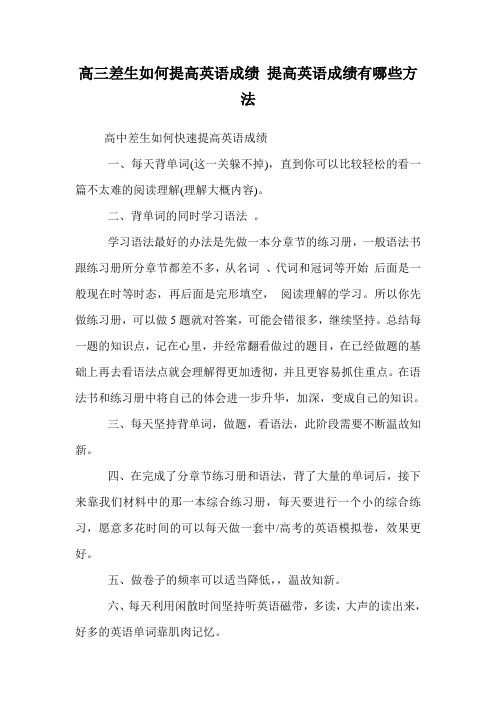
高三差生如何提高英语成绩提高英语成绩有哪些方法高中差生如何快速提高英语成绩一、每天背单词(这一关躲不掉),直到你可以比较轻松的看一篇不太难的阅读理解(理解大概内容)。
二、背单词的同时学习语法。
学习语法最好的办法是先做一本分章节的练习册,一般语法书跟练习册所分章节都差不多,从名词、代词和冠词等开始后面是一般现在时等时态,再后面是完形填空,阅读理解的学习。
所以你先做练习册,可以做5题就对答案,可能会错很多,继续坚持。
总结每一题的知识点,记在心里,并经常翻看做过的题目,在已经做题的基础上再去看语法点就会理解得更加透彻,并且更容易抓住重点。
在语法书和练习册中将自己的体会进一步升华,加深,变成自己的知识。
三、每天坚持背单词,做题,看语法,此阶段需要不断温故知新。
四、在完成了分章节练习册和语法,背了大量的单词后,接下来靠我们材料中的那一本综合练习册,每天要进行一个小的综合练习,愿意多花时间的可以每天做一套中/高考的英语模拟卷,效果更好。
五、做卷子的频率可以适当降低,,温故知新。
六、每天利用闲散时间坚持听英语磁带,多读,大声的读出来,好多的英语单词靠肌肉记忆。
小编推荐:高中英语成绩如何提高快速提高英语成绩的方法高中差生如何快速提高英语成绩一、平时多用碎时间,避免大突击大跃进;课文每天朗读一篇到三篇。
研究表明,英语课文念地结巴的,多半英语成绩不是特别好。
成绩很好的同学,基本上都能做到流利朗读。
二、高三阶段多做高考真题,少死扣模拟题;高考考察要点比较全面且难度适中。
同学们可以把近三年的高考题从头到尾做一下,熟悉高考的思路。
由于模拟题有的偏难,同学们可咨询老师,该放弃的就放弃。
特别是对语法不放心的同学们,把北京3年真题所有的单选题(语法填空题)正确答案代入,念熟,几乎囊括99%的语法。
三、第一轮复习时以单词、词组应用为主,阅读、完型难度循序渐进;高考英语其实并不难,把题目拆分来看,每个中等程度的同学都可能有把握做对。
如何提高差生的英语成绩(精选)

如何提高差生的英语成绩(精选)提高差生的英语成绩在学生群体中,总有一部分同学对英语学习感到困难,成绩相对较低,常常被称为“差生”。
然而,只要他们采取正确的学习方法和态度,就有可能提高自己的英语成绩。
本文将从多个方面探讨如何帮助差生提高英语成绩。
1. 了解差生困难的根源了解差生们在英语学习中遇到的问题是关键的一步。
可能存在的问题包括基础薄弱、学习态度不端正、缺乏自信心等。
有针对性地找出问题所在,才能采取相应的解决方法。
2. 建立良好的学习习惯良好的学习习惯对于提高英语成绩至关重要。
差生应该合理安排学习时间,每天预留固定的时间来进行英语学习。
同时,养成每日复习英语知识的习惯,避免遗忘。
此外,积极参与课堂互动,主动请教老师和同学,能够加深对知识点的理解和记忆。
3. 选择适合个人的学习方法差生们可以尝试不同的学习方法,找到适合自己的方法来提高英语成绩。
有的同学喜欢通过阅读来提升自己的英语水平,可以选择一些适合自己水平的英语原版书籍或者文章。
有的同学喜欢通过听力来提高,可以多听英语广播、电视节目或者使用学习APP。
总之,每个人都有自己独特的学习方式,差生需要根据自己的实际情况选择最适合自己的学习方法。
4. 修改学习态度和心理建设学习态度和心理建设对于提高英语成绩起着关键作用。
差生应该树立正确的学习态度,积极对待英语学习。
不要被过去的成绩影响自己的信心,要坚信只要努力,一定能够取得进步。
同时,要学会放松自己,在学习之余寻找一些喜欢的活动来缓解压力,保持良好的心态。
5. 制定有效的学习计划差生需要制定有效的学习计划,有计划地安排英语学习内容和时间,确保每个知识点都能够得到充分的复习和训练。
在制定学习计划时要具备可行性和实效性,不能过于理想化,要结合实际情况来安排,同时也要留出适量的休息和娱乐时间。
6. 寻求帮助和支持差生不应该孤军奋战,应该主动寻求他人的帮助和支持。
可以向老师请教问题,与同学互相合作学习,或者寻找一些英语学习小组来相互激励。
高中英语教学论文 差生如何学习高三英语

高中英语教学论文:差生如何学习高三英语
紧张的高三学习即将开始,许多同学因为英语成绩不佳而忧心忡忡。
其实你不必担心,只要自己下定决心,采取适合自己的学习方法,勤奋努力,完全可以在短时间内提高英语成绩。
造成英语成绩不佳的原因很多,如较低的学习兴趣、不良的学习习惯、身体的疾病,外界的干扰等。
首先要好好反省,认识到自己存在的问题,再对症下药,下面介绍一些学习方法,供大家参考。
一、分析存在的问题
l .时间安排问题
(1) 是否很少在学习前确定明确的目标
(2) 是否没有固定的时间安排
(3) 是否常拖延时间以至于作业都无法按时完成
(4) 学习计划是否是只能在开头的几天有效
(5) 是否把所有的时问都花在学习上。
2 .注意力问题
(1) 注意力完全集中的状态是否只能保持 10 至 15 分钟
(2) 学习时,身旁是否常有小说、杂志、电视等分心的东西
(3) 是否常与人边聊天边学习。
3 .学习兴趣问题
(1) 是否一见英语书头就发胀
(2) 是否喜欢其他学科,不喜欢英语
(3) 是否常需要强迫自己学习。
高中英语成绩如何提高 英语差生复习技巧_0
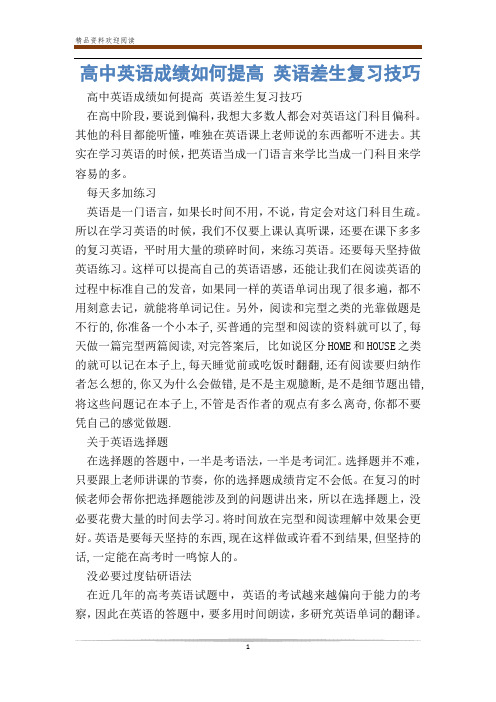
高中英语成绩如何提高英语差生复习技巧高中英语成绩如何提高英语差生复习技巧在高中阶段,要说到偏科,我想大多数人都会对英语这门科目偏科。
其他的科目都能听懂,唯独在英语课上老师说的东西都听不进去。
其实在学习英语的时候,把英语当成一门语言来学比当成一门科目来学容易的多。
每天多加练习英语是一门语言,如果长时间不用,不说,肯定会对这门科目生疏。
所以在学习英语的时候,我们不仅要上课认真听课,还要在课下多多的复习英语,平时用大量的琐碎时间,来练习英语。
还要每天坚持做英语练习。
这样可以提高自己的英语语感,还能让我们在阅读英语的过程中标准自己的发音,如果同一样的英语单词出现了很多遍,都不用刻意去记,就能将单词记住。
另外,阅读和完型之类的光靠做题是不行的,你准备一个小本子,买普通的完型和阅读的资料就可以了,每天做一篇完型两篇阅读,对完答案后, 比如说区分HOME和HOUSE之类的就可以记在本子上,每天睡觉前或吃饭时翻翻,还有阅读要归纳作者怎么想的,你又为什么会做错,是不是主观臆断,是不是细节题出错,将这些问题记在本子上,不管是否作者的观点有多么离奇,你都不要凭自己的感觉做题.关于英语选择题在选择题的答题中,一半是考语法,一半是考词汇。
选择题并不难,只要跟上老师讲课的节奏,你的选择题成绩肯定不会低。
在复习的时候老师会帮你把选择题能涉及到的问题讲出来,所以在选择题上,没必要花费大量的时间去学习。
将时间放在完型和阅读理解中效果会更好。
英语是要每天坚持的东西,现在这样做或许看不到结果,但坚持的话,一定能在高考时一鸣惊人的。
没必要过度钻研语法在近几年的高考英语试题中,英语的考试越来越偏向于能力的考察,因此在英语的答题中,要多用时间朗读,多研究英语单词的翻译。
我们学英语并不是对英语这门学科做文学鉴赏,而是把英语当做一门语言进行交流。
在高中背景下,我们很少有英语交流环境,那么只能多翻译,多朗读。
高考英语朝着实际应用方面转化,我们也必须把观念扭转。
高三英语基础差怎么复习
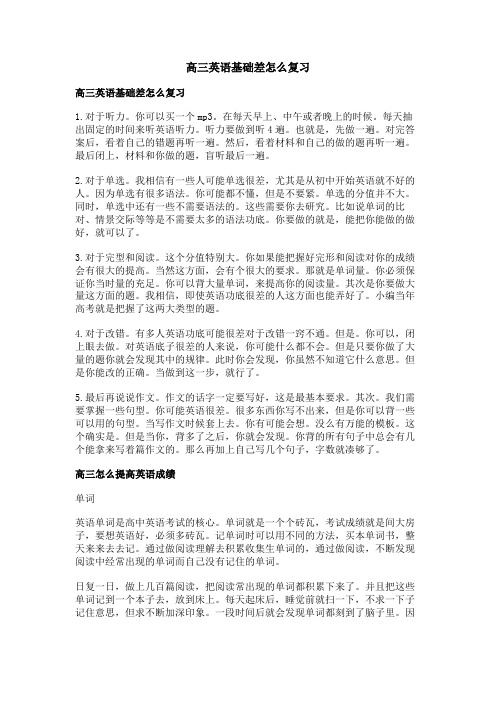
高三英语基础差怎么复习高三英语基础差怎么复习1.对于听力。
你可以买一个mp3。
在每天早上、中午或者晚上的时候。
每天抽出固定的时间来听英语听力。
听力要做到听4遍。
也就是,先做一遍。
对完答案后,看着自己的错题再听一遍。
然后,看着材料和自己的做的题再听一遍。
最后闭上,材料和你做的题,盲听最后一遍。
2.对于单选。
我相信有一些人可能单选很差,尤其是从初中开始英语就不好的人。
因为单选有很多语法。
你可能都不懂,但是不要紧。
单选的分值并不大。
同时,单选中还有一些不需要语法的。
这些需要你去研究。
比如说单词的比对、情景交际等等是不需要太多的语法功底。
你要做的就是,能把你能做的做好,就可以了。
3.对于完型和阅读。
这个分值特别大。
你如果能把握好完形和阅读对你的成绩会有很大的提高。
当然这方面,会有个很大的要求。
那就是单词量。
你必须保证你当时量的充足。
你可以背大量单词,来提高你的阅读量。
其次是你要做大量这方面的题。
我相信,即使英语功底很差的人这方面也能弄好了。
小编当年高考就是把握了这两大类型的题。
4.对于改错。
有多人英语功底可能很差对于改错一窍不通。
但是。
你可以,闭上眼去做。
对英语底子很差的人来说,你可能什么都不会。
但是只要你做了大量的题你就会发现其中的规律。
此时你会发现,你虽然不知道它什么意思。
但是你能改的正确。
当做到这一步,就行了。
5.最后再说说作文。
作文的话字一定要写好,这是最基本要求。
其次。
我们需要掌握一些句型。
你可能英语很差。
很多东西你写不出来,但是你可以背一些可以用的句型。
当写作文时候套上去。
你有可能会想。
没么有万能的模板。
这个确实是。
但是当你,背多了之后,你就会发现。
你背的所有句子中总会有几个能拿来写着篇作文的。
那么再加上自己写几个句子,字数就凑够了。
高三怎么提高英语成绩单词英语单词是高中英语考试的核心。
单词就是一个个砖瓦,考试成绩就是间大房子,要想英语好,必须多砖瓦。
记单词时可以用不同的方法,买本单词书,整天来来去去记。
高三英语差生怎么提高成绩-词汇、语法、阅读复习方法送给你
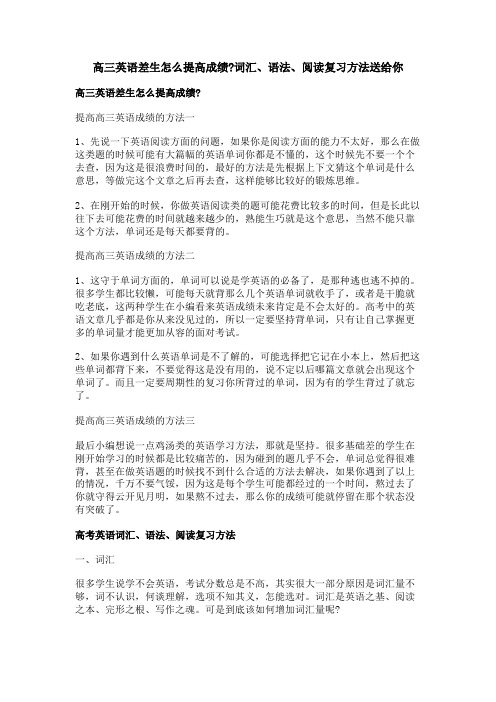
高三英语差生怎么提高成绩?词汇、语法、阅读复习方法送给你高三英语差生怎么提高成绩?提高高三英语成绩的方法一1、先说一下英语阅读方面的问题,如果你是阅读方面的能力不太好,那么在做这类题的时候可能有大篇幅的英语单词你都是不懂的,这个时候先不要一个个去查,因为这是很浪费时间的,最好的方法是先根据上下文猜这个单词是什么意思,等做完这个文章之后再去查,这样能够比较好的锻炼思维。
2、在刚开始的时候,你做英语阅读类的题可能花费比较多的时间,但是长此以往下去可能花费的时间就越来越少的,熟能生巧就是这个意思,当然不能只靠这个方法,单词还是每天都要背的。
提高高三英语成绩的方法二1、这守于单词方面的,单词可以说是学英语的必备了,是那种逃也逃不掉的。
很多学生都比较懒,可能每天就背那么几个英语单词就收手了,或者是干脆就吃老底,这两种学生在小编看来英语成绩未来肯定是不会太好的。
高考中的英语文章几乎都是你从来没见过的,所以一定要坚持背单词,只有让自己掌握更多的单词量才能更加从容的面对考试。
2、如果你遇到什么英语单词是不了解的,可能选择把它记在小本上,然后把这些单词都背下来,不要觉得这是没有用的,说不定以后哪篇文章就会出现这个单词了。
而且一定要周期性的复习你所背过的单词,因为有的学生背过了就忘了。
提高高三英语成绩的方法三最后小编想说一点鸡汤类的英语学习方法,那就是坚持。
很多基础差的学生在刚开始学习的时候都是比较痛苦的,因为碰到的题几乎不会,单词总觉得很难背,甚至在做英语题的时候找不到什么合适的方法去解决,如果你遇到了以上的情况,千万不要气馁,因为这是每个学生可能都经过的一个时间,熬过去了你就守得云开见月明,如果熬不过去,那么你的成绩可能就停留在那个状态没有突破了。
高考英语词汇、语法、阅读复习方法一、词汇很多学生说学不会英语,考试分数总是不高,其实很大一部分原因是词汇量不够,词不认识,何谈理解,选项不知其义,怎能选对。
词汇是英语之基、阅读之本、完形之根、写作之魂。
高三理科差生如何快速提高英语成绩
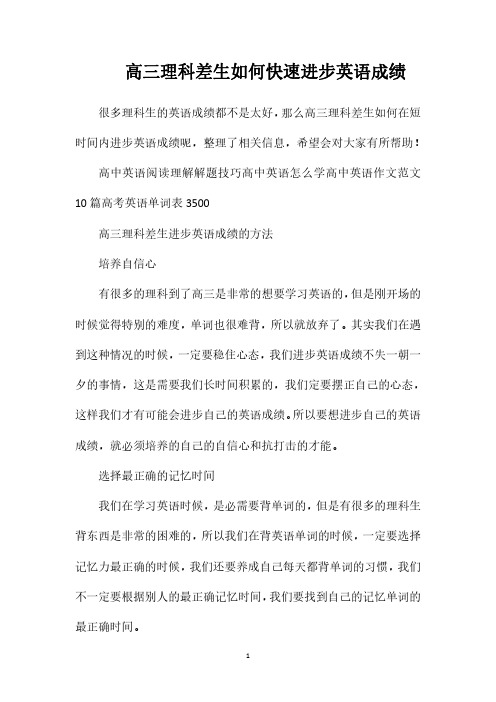
高三理科差生如何快速进步英语成绩很多理科生的英语成绩都不是太好,那么高三理科差生如何在短时间内进步英语成绩呢,整理了相关信息,希望会对大家有所帮助!
高中英语阅读理解解题技巧高中英语怎么学高中英语作文范文10篇高考英语单词表3500
高三理科差生进步英语成绩的方法
培养自信心
有很多的理科到了高三是非常的想要学习英语的,但是刚开场的时候觉得特别的难度,单词也很难背,所以就放弃了。
其实我们在遇到这种情况的时候,一定要稳住心态,我们进步英语成绩不失一朝一夕的事情,这是需要我们长时间积累的,我们定要摆正自己的心态,这样我们才有可能会进步自己的英语成绩。
所以要想进步自己的英语成绩,就必须培养的自己的自信心和抗打击的才能。
选择最正确的记忆时间
我们在学习英语时候,是必需要背单词的,但是有很多的理科生背东西是非常的困难的,所以我们在背英语单词的时候,一定要选择记忆力最正确的时候,我们还要养成自己每天都背单词的习惯,我们不一定要根据别人的最正确记忆时间,我们要找到自己的记忆单词的最正确时间。
制定方案
学好高中的英语,制定相应的方案也是必不可少的,有很多的同学在制定方案的时候不符合切身的情况,导致了目的根据本就完不成,打击了自己的自信心,这对进步自己的英语成绩是没有什么帮助的,我们在制定方案的时候,一定根据自己的实际情况,清楚的知道自己的真实程度,每个阶段制定不同方案,这样我们实现起来就会更加的容易了。
多做阅读题
其实我们在做阅读题的时候,也是在间接的掌握了单词,我们遇到不会的英语单词一定要及时的去查字典,这样我们既能做题,又能背单词。
高中英语零基础怎么自学 一个差生的英语逆袭

高中英语零基础怎么自学一个差生的英语逆袭高中英语零基础怎么自学一个差生的英语逆袭英语作为世界使用最广泛的语言,那么,一个高中英语零基础的学生怎么自学呢?下面就为大家介绍下一个高中英语差生的逆袭之路,希望能对大家有所帮助。
高中英语零基础怎么自学你是学习者,你主导所有的学习,当你罢工时,一切的一切就归零。
所以,要让自己成为一个坚固的堡垒,抵抗外来的侵袭。
外来的侵袭主要是惰性与退缩。
三天捕鱼两天晒网,持续力不够,这是惰性;遇到高中英语困难就选择放弃,这是退缩。
想要克服,不难,那就是你的心要够坚强。
坚强来自于学习高中英语的热情。
有一本杂志做过调查,企业主认为自己成功的关键特质是什么?排行第一的特质就是热情!热情会带出坚持与专注,做任何事情就容易成功。
如何点燃热情?我个人认为是动机,内在最深层的想望!想要培养热情,那就找出你的学习动机。
为什么想学好高中英语?请把动机写下来,这些动机必须够强烈,能够感动你自己。
尔后在高中英语学习的过程中,如果遇到困难与不耐烦时,就可以靠着学习的初衷重新灌注自己力量。
学习的动机因人而异,例如,工作需求、旅游、考试、结交朋友、阅读资料等等记得以前一位同事,他说讲英语是他从小的梦想,所以即使已经六十几岁了,他见到人就是说英语。
这样的热情,让人感动,不是吗?重头学起,看似简单,但是学习者总是千头万绪,找不到着力点。
我个人认为,首重建立正确的观念。
学习高中英语没有捷径,也妄想有捷径,必须认清这个事实。
试想,我们花多少时间学习中文,以及多少时间浸染在说中文的环境里,然而大部分人的中文能力也只是普通罢了!更何况,我们是在没有英语环境下学习英语,其困难度之高,不难想像。
所以,学习高中英语切勿心急,不要好高骛远、囫囵吞枣,必须一步一脚印,靠时间点滴累积,方能有所成就。
学习基础高中英语,一定要从发音开始,语言有了声音,学习就会变得容易。
初学者,我建议学习KK音标。
自然发音法,初学者容易因为母音变化感到困惑;再者,初学高中英语,外国语音会感到相当的陌生与抽象,如果没有发音符号标示如何发音,单靠耳朵听音,许多初学者会有学习的困难与挫折。
英语差生,高考是怎么考到120+的

英语在高三这一年从不及格到高考120+的学习方法我没有一步登天的技巧,记忆力个人感觉也很一般,所以我的成绩能提高就表示所有人英语都是能很快提高的.以下就是我的学习过程和心得体会:1.信心,是指能战胜英语的自信.2.词汇,每天坚持记忆一两个单元的词汇,并读本单元的课文中,找语感并检查词汇是否记牢。
3.看语法书,看完一本语法书,并真正的看懂,并总结书中的类容。
4.肯定会有很多试卷做,要把错题全部弄懂。
5.学英语要系统的学习,要把平时遇到的各个分散的知识点归纳到自己的系统中。
这样记住的就不容易忘记了。
英语在于坚持,成绩不会再一两个月有变化,所以一定要挺住,到考试时成绩肯定会吓你一跳。
这样学习有个不好的地方,应付高考很容易,可是口语得不到很好的提高,所以要想口语也练好,还需要这么做才行。
说到口语,我觉得听奥巴马的演讲时一个很好的途径.不过高中生应付高考的话大可不必这么做。
我现在每天都在听他的演讲,显示慢速的听,听一段时间后,变为正常速度,最后快速.感觉自己在一天天的提高,然后听听其它的文章,拓宽材料的范围.材料可分为:1.文学类2.社会类3.科学类4.生活类,生活类就是听力考试的最主要的材料,例如:1.谈天气2.谈旅行3.谈吃4.谈共同的朋友等务必要在高考前把这些材料听的想吐,听到上句就能猜到下句要说什么,针对不同的材料,记忆不同的频率很高的单词和句子。
这样就做到了胸有成竹,不论怎么考都在你的掌握之中了,还怕什么,怕就是自己考得太好把自己吓一大跳把。
科学类和社会类的,也要适当听一些,对于自己的提高很重要,接触的东西多了才更有底气。
听多了还要自己大声读出来,有时间再考虑背出来。
高中就把英语学好吧,大学在等着你,真心祝愿那些英语成为上大学绊脚石是同学们能战胜英语,迎接美好的未来。
高三英语培优补差教学计划

高三英语培优补差教学计划高三英语培优补差教学计划人生天地之间,若白驹过隙,忽然而已,我们的工作又将迎来新的进步,此时此刻我们需要开始做一个计划。
那么你真正懂得怎么制定计划吗?下面是我帮大家整理的高三英语培优补差教学计划,欢迎阅读,希望大家能够喜欢。
高三英语培优补差教学计划1一、指导思想提高优生的自主和自觉学习能力,进一步巩固并提高中等生的学习成绩,帮助差生取得适当进步,让差生在教师的辅导和优生的帮助下,逐步提高学习成绩,并培养较好的学习习惯,形成英语学习基本能力。
培优计划要落到实处,发掘并培养一批英语学习能手,挖掘他们的潜能,训练良好学习习惯,从而形成较扎实的基础和交际说话能力,并能协助老师进行辅差活动,提高整个班级的英语素质和英语成绩。
二、工作目标1、加强对培优补差工作的`常规管理和检查。
2、认真挑选好培优补差的对象。
3、通过培优补差,使学生能充分认识到学习的重要性。
4、认真做好学生的辅导工作,每周至少3次的辅导,辅导要有针对性和可行性。
三、具体措施1、利用课堂上多鼓励学生生动口说,优生先示范再叫中下学生跟读,给优生有自主发挥的机会,假如中下还是说错或不开口,动员全班同学勉励他,排除其心理障碍。
2、课堂上处理不好的,利用课余时间教导。
与学生多谈心,讲些小故事,激发他们学英语的兴趣。
读错、说错不要紧,最重要的是他肯开口说,循序渐进,由浅入深。
3、积极挖掘学生的闪光点。
鼓励优生用多种途径表达语言,活跃他们的思维。
多表扬中下生,只要他们有一点进步,都要及时鼓励,使其增强自信心。
4、实行一帮一活动,让中、下生有自己的“私人老师”。
培养他们团结友爱,共同进步的班风。
高三英语培优补差教学计划2一、指导思想结合本校实际情况,五年级学生之间学习、纪律等情况的异常区别,为提高优等生的自主和自觉学习能力,进一步巩固并提高中等生的学习成绩;同时帮助差生取得适当进步,让学生在教师的辅导和优生的帮助下,逐步提高学习自信心和能力,培养较好的学习生活习惯,并逐步提高纪律意识和思想道德水平,形成良好的自身素质,我把培优辅差工作当作自己教学中的一个重要的事情来进行,让培辅计划落到实处,特制定此计划。
高三英语特别差的学生该怎么办_高考英语差生提分技巧

高三英语特别差的学生该怎么办_高考英语差生提分技巧高三英语特别差的学生该怎么办1.阅读理解和完形填空这两块分值占比非常大,基础薄弱的考生,要重点攻略。
一般阅读理解都是故事文,理解内容,知道上下文逻辑关系,选择题就好做很多了。
完形填空主要注意单词的词义、时态、变形。
2.作文考生可以针对性背诵一些范文,记一些常用的表达方式,英语作文最好分三段写,总分总的结构形式。
同时注意使用语法和一些连接词,不需要很多,*中出现一两处高级句型就可以了。
3.提高词汇量,抓考点重点高考大纲最低要求是3500词,单词量不足,阅读理解*是看不懂得,靠猜肯定不行,所以提升自身的词汇量还是重中之重。
而且高考英语大纲内容学生都是知道的,一些重点词汇每天都要记忆背诵。
不想背那么多,那就找重点词汇背和用法,节省更多的时间,也会大大提高学习英语效率。
高考英语差生提分技巧背单词的时候可以采用串记法、联想法、图像法,乱七八糟什么方法适合就使用什么方法。
每个人的情况不一样。
每天大概是一个半小时的固定时间,背完100个单词不要求多。
剩下的时间用来巩固以前背的,然后至少要有半个小时看英语阅读,带翻译的那种。
遇到不认识的单词的时候不要,好好的想一想,要是真的不认识就过去。
刚开始的时候可能很难,看阅读就是要培养语感,还有巩固你背诵的单词。
不然你背的滚瓜烂熟的单词,很容易就会忘记。
为什么遇到不会的单词不要去,因为你没有那么多的时间,而且这些单词等你将重点词汇背诵完了,基本上都是会的。
至于那些没有背诵到的,不是重点词汇,更不用去花时间。
高考报名需要注意什么首先要知道什么时候高考报名,知道确切的时间,我们能够有充足的时间去报名需要的资料,如果是在学校报名的同学,老师就会告诉应该准备什么,其实高考报名最需要注意的就是不是在学校报名的同学,这类同学的一些报名手续是需要自己打听好,准备好,然后去相应的报名网站去报名。
一般在高考报名之前,是需要审查你的资格的,只有你资格符合了,才能在相应的网站报名,而且还要填写一份报名信息,这都是我们在高考报名之前需要做的,填完信息之后,拿着相应的证件,去登录系统填报信息就可以了。
给差生准备的英语范文
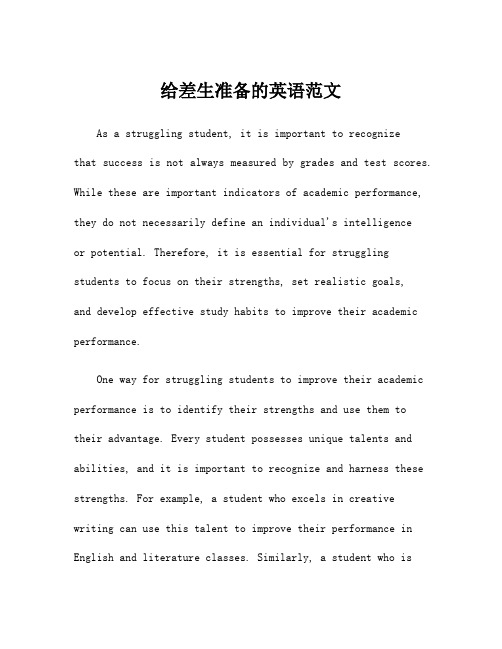
给差生准备的英语范文As a struggling student, it is important to recognizethat success is not always measured by grades and test scores. While these are important indicators of academic performance, they do not necessarily define an individual's intelligenceor potential. Therefore, it is essential for struggling students to focus on their strengths, set realistic goals,and develop effective study habits to improve their academic performance.One way for struggling students to improve their academic performance is to identify their strengths and use them totheir advantage. Every student possesses unique talents and abilities, and it is important to recognize and harness these strengths. For example, a student who excels in creativewriting can use this talent to improve their performance in English and literature classes. Similarly, a student who isskilled in problem-solving and critical thinking can apply these abilities to excel in math and science classes.Setting realistic goals is another important aspect of improving academic performance. Struggling students should set specific, achievable goals for themselves and work towards achieving them. For example, a student who is struggling in a particular subject can set a goal to improve their grade by a certain percentage by the end of the semester. By setting clear and attainable goals, students can stay motivated and focused on their academic improvement.Developing effective study habits is crucial for struggling students to succeed. This includes creating a dedicated study space, setting aside specific times for studying, and staying organized. Additionally, students should practice active learning techniques such as taking notes, asking questions, and seeking help when needed. By developing effective study habits, struggling students canmaximize their learning potential and improve their academic performance.In addition to focusing on their strengths, setting realistic goals, and developing effective study habits, struggling students should also seek support from teachers, tutors, and classmates. Teachers and tutors can provide additional resources and guidance to help struggling students improve their performance. Similarly, classmates can offer peer support and collaboration opportunities for studying and learning.Ultimately, improving academic performance as astruggling student requires effort, determination, and a positive mindset. By recognizing and utilizing their strengths, setting realistic goals, developing effective study habits, and seeking support from others, struggling students can work towards achieving academic success. It is important for these students to remember that success is notsolely determined by grades and test scores, but by their growth, perseverance, and commitment to learning. With the right mindset and approach, struggling students can overcome obstacles and thrive academically.。
帮助差生提高成绩作文500字,英语

帮助差生提高成绩作文500字,英语全文共6篇示例,供读者参考篇1Helping Struggling Students Get Better GradesI'm just a kid, but I've learned a few things about how to get better grades in school. It's not easy, but if you follow these tips, I really think they can help you out!First off, you have to start paying attention in class. I know, I know, it's booooring to just sit there and listen to the teacher drone on and on. But here's the thing - that's actually really important stuff they're teaching you! If you zone out or goof around, you're going to miss key things that'll be on tests and assignments later.Instead of letting your mind wander, try focusing really hard on what the teacher is saying. Look them in the eye, nod along, and if you don't understand something, put your hand up and ask them to explain it again. The teachers are there to help you learn, so don't be afraid to ask questions! Jot down notes about the main ideas too - that'll reinforce what you're learning.Speaking of notes, keeping an organized notebook or binder for each subject is crucial. When it's time to study for a test, having a clear record of what you covered in class will make reviewing so much easier. Use dividers, labels, highlights, or whatever works for you to keep things tidy.You should also get into the habit of doing your homework as soon as you get home from school, while the lessons are still fresh in your mind. Don't just copy the answers from a friend or the internet - that's cheating and you won't actually learn anything that way. If you get stuck, look back at your notes, ask a parent or older sibling for help, or see if your teacher can explain it differently.Learning good study habits takes practice, but it's a skill that'll pay off big time. Instead of cramming the night before a test, set aside time to review your materials a little bit each day starting about a week ahead. Create flashcards, re-write your notes, watch videos online - mix it up and find methods that work for your learning style.Oh, and when it's test day, get a good night's sleep and have a healthy breakfast to keep your brain fueled. Double check that you have all the supplies you'll need like pencils, calculators, etc. Take deep breaths if you feel nervous - just do your best!Another really important tip is to get help early if you're struggling. Don't be embarrassed or wait until you're really behind. Talk to your teacher, see if there's free tutoring at school, or even ask a parent to look into hiring a tutor. Sometimes just getting a new perspective from someone else can clear up what was confusing you.Having a positive attitude goes a long way too. School can be tough, but trying your hardest and not giving up is so important. Even if you don't get an A, improving bit by bit and feeling proud of your effort is the key. It's all about consistent hard work.Just imagine how great you'll feel when you see your report card improving! You'll know it was all worth it. And getting good grades now will open up so many future opportunities for fun activities, cool jobs, and making your family proud.I'm rooting for you! Just take it step-by-step, stay focused and motivated, and don't be afraid to ask for support when you need it. You've got this!篇2Helping Struggling Students Do Better in SchoolHey there! My name is Jamie and I'm in 5th grade. I used to really struggle with my grades and keeping up in class. School just always felt super hard for me. But over the last couple of years, I've figured out some tips and tricks that have really helped me turn things around. I want to share them with you in case you're having a tough time too!First off, it's so important to never feel bad about yourself for finding school difficult. We all have different strengths and weaknesses. Just because learning doesn't come naturally to you doesn't mean there's anything wrong with you at all! You're still awesome and capable of anything you set your mind to.That said, here are some of the things that have made the biggest difference for me:Ask questions! This was huge for me. For a long time, I was too shy or embarrassed to put my hand up when I didn't understand something. But teachers want to help you learn - that's their whole job! Don't be afraid to ask for clarification or examples if a lesson doesn't make sense. Chances are other kids are confused too and will be relieved when you speak up.Take good notes. When teachers are going over stuff, write down anything that seems important or confusing so you can review it later. Use shorthand, abbreviations, and sketches if ithelps you capture the main points faster. Having good notes makes studying so much easier.Find a study buddy. Having a friend to go over materials with can be really helpful! You can quiz each other, explain things in your own words, and make sure you both really grasp the concepts before a test. My best friend Emma and I always study together before big exams.Stay organized. For me, a lot of my struggles came from missing assignments, losing handouts, and not keeping my notebook and binders neat. Get yourself a daily planner or agenda to write down homework, projects, and test dates. Use different folders or binders for each subject. Clean out your backpack regularly. Being organized prevents so much stress!Advocate for yourself. If you're really struggling with a subject despite trying your best, don't be afraid to ask your teacher or parents for extra help or tutoring. Maybe you could join a study group or get paired with a classroom helper. There are always options if you speak up about needing more support.Find the right learning style for you. We all learn in different ways - some people are visual learners who benefit from diagrams and charts, others are auditory learners who do better listening to explanations. I'm more of a kinesthetic learner andremember things best when I can handle objects or act things out. Figure out what works for your brain and adjust your study habits accordingly.Take breaks! Your brain needs to recharge, so follow the50/10 rule: study for 50 minutes, then take a 10 minute break to rest, have a snack, play for a bit, etc. You'll come back to your work refreshed and ready to refocus.Get enough sleep. Being overtired makes it way harder to concentrate and absorb information. Stick to a regular bedtime that gives you 8-10 hours to sleep each night. Your health and your grades will thank you!Have a positive mindset. This is crucial! Don't beat yourself up over mistakes or struggles. Learning takes time and effort for everyone. Celebrate small wins, let go of setbacks quickly, and keep telling yourself "I can do this!" Self-belief is incredibly powerful.Don't forget to have fun! Being a student is your full-time job right now, but you need balance. Make time for activities, hobbies, and friends you enjoy. A happy kid is one who can learn and succeed.I really hope some of those tips give you a boost, whether you're having a hard time with a certain subject or just want to become a stronger student overall. Just remember, you've totally got this! Stick with it, use the right strategies for you, and don't be afraid to ask for help when you need it. Before you know it, you'll be acing those assignments and tests. Sending you all my best!篇3Title: My Journey to Better GradesHi there! My name is Emma, and I'm a 5th grader at Sunshine Elementary School. Like many kids my age, I used to find school really tough. I would get bad grades on tests and assignments, and I felt like I was falling behind my classmates. But over the past year, I've learned some awesome tricks that have helped me turn things around and boost my scores. Let me share my story with you!When I was in 4th grade, I remember feeling so frustrated and discouraged. No matter how hard I tried, I just couldn't seem to understand the lessons in class. Math was my biggest struggle – I would get the steps all mixed up and end up with the wrong answers. Reading comprehension was also really difficult for me.I would read the passages, but then I couldn't remember or explain what they were about.My parents were really worried about me. They could see how unhappy I was, and they wanted to help me succeed. We had meetings with my teachers, and they gave us some great advice. The first thing they suggested was getting me extra academic support.My parents hired a tutor to work with me a couple of times a week after school. At first, I wasn't too excited about having to spend more time on schoolwork. But my tutor, Ms. Lily, was really nice and patient. She would re-explain concepts to me in simpler terms until I understood them. She also gave me customized practice problems and reading passages that matched my level. Slowly but surely, my skills started improving.Another big change was related to my habits and routine at home. My parents made me a designated study space – a little desk area in the living room away from distractions like the TV. They also helped me organize my backpack, binders, and supplies so I could stay on top of my assignments. We made a schedule that included set times for me to work on homework right after school.In the beginning, following a routine was hard for me. I would get antsy and want to go play outside with my friends instead of hitting the books. But my parents were firm, and I knew it was for my own good. After a few weeks, it became a regular habit, just part of my normal day. Having a structured schedule for homework and studying really helped me stay focused and get my work done efficiently.My teachers also taught me some cool strategies for approaching challenging material. For math, using visuals and manipulatives (like counting blocks) really helped me grasp concepts instead of just memorizing steps. My reading comprehension improved when I learned to take notes and summarize key points as I went through passages. Making flashcards and study guides also aided my retention.With all this extra support and effort, I could feel myself making progress steadily. My grades weren't perfect overnight, but I went from D's and F's to C's, then B's. Seeing that improvement was so motivating and made me want to work even harder. By the end of 4th grade, I was earning A's and B's consistently!Now that I'm in 5th grade, I've kept up my good habits like following a routine, taking notes, and doing practice work. I'mdetermined to keep my grades high so I can get into an awesome middle school program next year. Looking back, I'm so proud of how far I've come. If you're a student who's struggling like I once was, please don't get discouraged! With the right strategies, support, and perseverance, you can absolutely turn things around.Just take it step-by-step and don't be afraid to ask for help from parents, teachers, or tutors. Believe in yourself, work hard, and have patience. You've got this! If an once-struggling student like me could boost her grades, you can too. Wishing you the best of luck!篇4How to Help Struggling Students Improve Their GradesSchool can be really tough sometimes, especially if you're having a hard time understanding the material or keeping up with all the homework and tests. I know because I used to struggle a lot in certain subjects until I learned some helpful tips and strategies.The first thing that really made a difference for me was asking for help when I needed it. I used to feel embarrassed or afraid to raise my hand in class when I was confused. But then Irealized that's what teachers are there for - to help us learn! They want us to understand and do well. So don't be shy about asking your teacher to explain something again or to go over a concept you're having trouble with after class. The teachers I know are always happy to help.It's also a great idea to get some extra academic support outside of class time. See if your school has an after-school tutoring program or homework club you can join. Having a tutor who can work with you one-on-one and give you individualized assistance is super helpful. Or maybe you have an older brother, sister, cousin or neighbor who is really good at the subject you struggle with and wouldn't mind helping you out sometimes. Getting that extra bit of focused attention makes such a difference.Another thing that helps a lot is being an active, engaged learner during lessons rather than just sitting there passively. Look at your teacher and listen carefully instead of daydreaming. Nod your head when you understand and ask questions when you don't. Participate in class discussions. Take good notes to refer back to later. Do the examples and practices along with the teacher instead of just watching. Being mentally checked in helps the information stick better in your brain.You should also make sure you have good study habits and skills. Set aside a regular time each day to work on homework and review material from class. Find a quiet, distraction-free spot to study. Take breaks when you need to, but don't procrastinate! Use techniques like making flashcards, drawing diagrams, creating mnemonics, and explaining concepts out loud to yourself. Different strategies work for different people, so experiment until you find what works best for you.Getting enough sleep is crucial too. Our brains really need that rest in order to learn and remember information well. Lack of sleep makes it way harder to pay attention and concentrate. Aim for 8-11 hours per night, depending on your age. I know that sounds like a ton, but it makes a big difference!Finally, take care of yourself physically and emotionally. Make sure to eat a healthy diet with plenty of nutritious foods to give your body and mind energy. Get regular exercise, even if it's just running around at recess. Do relaxing activities you enjoy to relieve stress. And don't be afraid to ask a teacher, parent, counselor or other trusted adult for help if you're feeling sad, anxious, overwhelmed or like you're struggling with an issue. Your mental health is so important.I really hope some of these tips and suggestions are useful for you or someone you know who is having a tough time academically. Just know that it's totally normal to find certain subjects or assignments challenging sometimes. The important thing is to have the courage to ask for support and use all the resources available to help you learn and succeed. It might take some hard work, but you've got this! Believe in yourself and never give up. Your future is so bright!篇5How to Help Students Who Are Struggling in SchoolSchool is really important because that's where you learn all the stuff you need to know for life. But sometimes, school can be really hard and frustrating, especially for kids who are having trouble understanding the lessons or keeping up with the work. If you're one of those kids who feels like you're falling behind, don't worry - there are lots of ways to get the help you need to do better!First of all, it's super important to pay close attention in class and listen carefully when the teacher is talking. I know it can be tempting to goof off and not focus, but you'll miss out on all the key points and explanations if you're not tuned in. If you findyour mind wandering, try squeezing a stress ball or doodling to help you stay focused without disrupting the lesson.And don't be afraid to ask questions if you get confused! There's no such thing as a dumb question. The teachers are there to help you understand, so put your hand up and get clarification on anything you're not sure about. Asking questions shows you care about learning, and that's awesome!Taking good notes is another big tip. Write down all the important stuff from the teacher's lessons and the textbooks. Having great notes to review later will make studying so much easier. Use colorful pens and highlighters to make your notes nice and organized too - that can really help the information stick in your brain.Speaking of studying, setting aside time every day to review your notes and do homework is crucial. Having a quiet,clutter-free space to work helps a lot. Some kids like listening to calm music while they study, while others prefer total silence. Figure out what works best for your learning style and make a habit of hitting the books for an hour or so every afternoon or evening.It's also a great idea to form study groups with friends who are good students. You can quiz each other, explain trickyconcepts, and motivate one another to keep working hard. Just make sure you don't get too distracted and stay focused on your goals.If you're still struggling after putting in your best effort, don't get discouraged! Ask your teacher or parents about getting a tutor. Having a tutor provide some one-on-one coaching and go over problems with you step-by-step can make a huge difference and help fill in any gaps in your knowledge.Your parents and teachers want to see you succeed just as much as you do. Be open with them about the subjects you're having a tough time with, and they can help come up with a plan to get you back on track. Maybe you need extra practice materials, different teaching methods to fit your learning style, or just some extra encouragement and confidence boosting.The most important thing is to never give up! Everyone learns at their own pace, so don't beat yourself up if you're finding certain topics really challenging. Stick with it, work your hardest, and take advantage of all the awesome resources available to students nowadays. Pretty soon, you'll start seeing your grades go up and feeling way more confident in your abilities. You've totally got this!篇6Title: My Journey to Better GradesHi there! My name is Emma, and I'm a 5th grader at Oakwood Elementary School. You know, school hasn't always been easy for me. I used to struggle a lot with my grades, and it felt like no matter how hard I tried, I just couldn't seem to improve. But then something changed, and I want to share my story with you in case it can help other kids who are going through the same thing.It all started when my parents had a meeting with my teacher, Mrs. Robinson. They were really worried about my grades and wanted to figure out what was going on. Mrs. Robinson explained that I was having trouble paying attention in class and that I often seemed distracted or daydreaming. She also said that I wasn't turning in my homework assignments on time, which was really hurting my grades.My parents were really concerned, and they decided to sit me down and have a serious talk. They told me that they knew I was capable of doing better in school, but that I needed to work on some things to help me succeed. They suggested that we come up with a plan together to help me improve my grades.The first thing we did was to create a dedicated study space for me at home. My parents cleared out a corner of the living room and set up a small desk and chair just for me. They also got me a cute little lamp and some colorful folders and pencils to help make it feel like my own special spot. Having a quiet place to do my homework and study really helped me to focus better.Next, we came up with a homework routine. Every day after school, I would have a snack and then go straight to my study corner to work on my assignments. My parents set a timer for an hour, and during that time, I had to stay focused and work hard without any distractions. It was tough at first, but after a while, I got used to it, and it really helped me to stay on top of my homework.Another thing that really helped me was using a planner to keep track of my assignments and test dates. My teacher gave us all these cool planners at the beginning of the year, but I had never really used mine properly. My mom showed me how to write down all of my homework assignments and test dates in the planner, and she helped me to make a schedule for when I would work on each one. Having everything written down in one place made it so much easier for me to stay organized and not forget anything important.One of the biggest things that helped me, though, was learning to ask for help when I needed it. I used to be really shy and afraid to raise my hand in class or stay after school to talk to my teacher. But Mrs. Robinson was so kind and patient, and she always made me feel comfortable asking questions or getting extra help. I also started going to the school's after-school tutoring program a couple of times a week, and that really helped me to catch up on anything I was struggling with.It wasn't an overnight process, but slowly but surely, my grades started to improve. I went from being a struggling student to getting mostly A's and B's on my report card. I felt so proud of myself, and my parents were over the moon! They took me out for ice cream to celebrate, and they told me how proud they were of all the hard work I had put in.So, if you're a kid who's having a hard time in school like I was, don't give up! Talk to your parents or teachers and come up with a plan to help you stay organized and focused. And remember, it's okay to ask for help when you need it – that's what your teachers and tutors are there for! With a little bit of hard work and determination, you can turn those bad grades around and start feeling proud of your achievements, just like I did.I hope my story has inspired you and given you some ideas on how to improve your own grades. Remember, you've got this! Just take it one step at a time, and before you know it, you'll be acing those tests and assignments. Good luck, and Happy Learning!。
英语高中差生作文
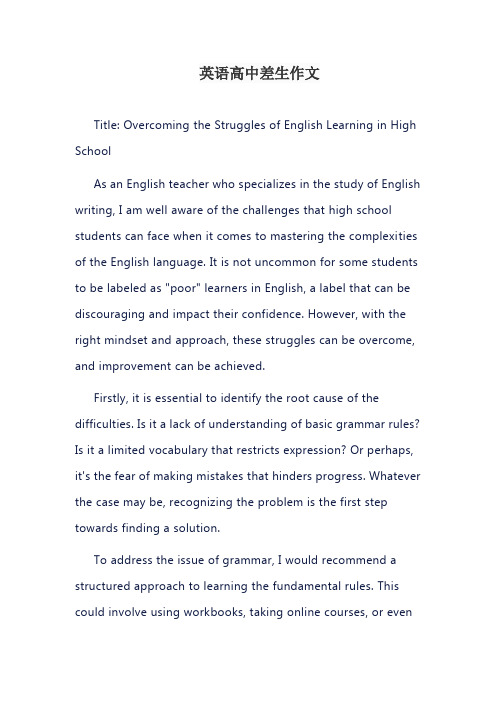
英语高中差生作文Title: Overcoming the Struggles of English Learning in High SchoolAs an English teacher who specializes in the study of English writing, I am well aware of the challenges that high school students can face when it comes to mastering the complexities of the English language. It is not uncommon for some students to be labeled as "poor" learners in English, a label that can be discouraging and impact their confidence. However, with the right mindset and approach, these struggles can be overcome, and improvement can be achieved.Firstly, it is essential to identify the root cause of the difficulties. Is it a lack of understanding of basic grammar rules? Is it a limited vocabulary that restricts expression? Or perhaps, it's the fear of making mistakes that hinders progress. Whatever the case may be, recognizing the problem is the first step towards finding a solution.To address the issue of grammar, I would recommend a structured approach to learning the fundamental rules. This could involve using workbooks, taking online courses, or evenattending after-school tutoring sessions. Consistent practice through exercises and quizzes can help solidify understanding and build confidence.For those struggling with vocabulary, a daily routine of reading can be incredibly beneficial. Starting with simpler texts and gradually moving to more challenging materials can expose students to a wide range of words and phrases. Keeping a vocabulary journal to note down new words and their meanings can also aid in memorization.Furthermore, writing regularly can be a powerful tool for improving English skills. Encouraging students to write about their interests, experiences, or opinions can make the task more enjoyable and relevant. Providing feedback on their writing, highlighting what they do well and where improvements can be made, will guide them towards better writing habits.It's also crucial to foster a positive mindset towards making mistakes. In language learning, errors are natural and serve as valuable learning opportunities. Instead of being afraid of mistakes, students should be encouraged to embrace them as steps towards progress.Lastly, creating a supportive environment both at home and in the classroom can significantly help struggling learners. Peer support groups, where students can share their challenges and offer each other advice, can build a sense of community and motivation. Teachers and parents should provide encouragement and recognize the effort put into learning, rather than solely focusing on grades.In conclusion, while being an English high school underachiever may seem daunting, it is by no means a permanent state. With dedication, the right strategies, and a supportive network, students can overcome their difficulties and become proficient English writers. The journey may be challenging, but the destination—fluency and confidence in English—is worth every effort.。
- 1、下载文档前请自行甄别文档内容的完整性,平台不提供额外的编辑、内容补充、找答案等附加服务。
- 2、"仅部分预览"的文档,不可在线预览部分如存在完整性等问题,可反馈申请退款(可完整预览的文档不适用该条件!)。
- 3、如文档侵犯您的权益,请联系客服反馈,我们会尽快为您处理(人工客服工作时间:9:00-18:30)。
英语基础知识学习第1课:1、be(是)动词的用法:am接I;is接第三人称单数,即除you、I外;are接表示多个人或事物,即复数。
(我是am,你是are,is连接它、她、他,单数is,复数are)。
2、not是表示否定的词:不是的表达,am not,is not(isn’t),are not(aren’t)。
3、“一个”和“几个”的问题:“一个”是a+名词;“多个”是名词后面加s。
4、以元音开头(如O、E等),前面的冠词用an。
第2课:1、及物动词与不及物动词的区别:及物动词后面接宾语;而不及物动词后面不接宾语。
如I like ice cream ,It hurts。
2、主语是he、she、it和单数名词时,动词要发生第三人称的变化,即加s。
3、否定的用法:在动词之前加do not或does not。
I、You和复数名词做主语时,否定就用do not;凡是单数名称和he、she、it做主语,否定就用does not。
第3课1、my(我的)、your(你的)、his(他的)、her(她的)、their(他们的)、our(我们的)、its(它的)+名词,如my love,your love 。
2、名词所有格形式为:名词+’s,表示“……的”,如Sophie’s world,children’s Day,Japan’s tomorrow。
3、用名词+of+名词,一般用在无生命的名词上,表示“……的’’,如The sound of music (音乐之声)。
第4课1、“have”和“there be”翻译成汉语都可以用一个“有”字来表示,但have是指主观的“所有、拥有”,而there be则是指客观的“存在,某处有某物”。
2、There be的单复数变化与be的变化规则相同,取决于后面所接的主语。
主语为单数,就变成there is,主语是复数,就变成there are。
3、“have”在第三人称单数时变成“has”。
4、“there be”的否定形式在be后加not,对于have通常直接在它的宾语前加“no”,表示“没有”的意思。
第5课1、一般疑问句概念:是可以用“yes”或“no”来回答的疑问句。
2、一般疑问句的结构模式:助动词+陈述句形式+如:Do you have a car No, I don’t 或Yes, I doAre you a chicken guy No , I am not 或Yes , I amIs there any cake in the icebox No , there isn’t 或 Yes , there is3、注意:Your boss has a car. Does your boss have a car 这句中的Has在助动词does提前时,需要改变成原形。
4、在一般疑问句中,表示“一些”的概念时,用Many而不用some。
第6课1、六个特殊疑问词:what(什么,对什么提问);where(在哪里,对地点提问);why (为什么,对原则提问);when(何时,对时间提问);who(谁,对人提问);how(怎么样,对方式提问)。
2、特殊疑问句:特殊疑问词+一般疑问句+。
3、特殊疑问句回答法:把句中的一般疑问句改为陈述句,再加上被提问部分。
例:Who am I Who is she What is her name Where do you liveHow old are you 你多大了 How old问年龄。
How long is the rope 这绳子有多长 How long问长度。
How far is it from A to B 从A至B有多远 How far 问距离。
What many books do you have 你有多少书 What many 对“可数名词的多少”提问。
What much is the book 这本书多少钱 What much 问价格How often do you visit here 你多久来拜访这里 How often 对“频率”提问。
第7课1、现在进行时:它是由主语+be动词+实义动词的ing形式构成的,表示现在正在发生和进行的动作。
比如:现在我在讲,你在听。
就应该说:Now I am talking,You are listing。
2、现在进行时的否定形式:就是在be动词的后面加Not来构成,这点和be动词的否定式是一样的。
3、两种进行时的基本法:一种与Now连用;另一种是与一些表示一段时间的词连用,表示现阶段正在进行的动作。
4、一般情况下,实义动词是可以直接加“ing”的,但有两种特殊的情况是需要有一些变化的。
第一种是像put和get这样以一个元音字母加一辅音字母结尾并重读的实义字母,需双写结尾的辅音字母再加ing,就是putting和getting。
第二种是以一个元音加e结尾的实义动词,要把“e”去掉,再加ing,如dance(跳舞),come(来)。
第8课1、动词的过去式:一般的动词后面可直接加“ed”。
但是以“e”结尾的动词,直接加“d”;以辅音字母加“y”结尾的词,变“y”为“i”加“ed”;一个元音字母+一个辅音字母结尾的词,且此音节重读,双写结尾的这个辅音字母,再加“ed”。
2、常用过去式时的一些时间状语。
3、过去时的否定和疑问结构。
第9课将来时的表达1、主语+will+动词原形,如:You will be rich。
主语+be going to+动词原形,如He is going to buy a car。
2、否定形式:主语+will not (won’t)+动词原形,如You will not be rich.主语+be not going to+动词原形,如Tom is not going to quit smoking.3、疑问形式:Will +主语+动词原形+ 如,Will you be richBe+主语+going to+动词原形+ 如,Are you going to study English第10课一般现在时1、一般现在时的含义:进行一般性描述。
2、动词单数第三人称的变化规则:(1)当主语是he、she、it和单数名词时,动词要发生第三人称的变化,即在词尾加s;(2)当主语是复数和you时,动词不发生变化;3、一般现在时的否定句:在动词原形前加don’t或doesn’t。
4、一般疑问句和特殊疑问句:(1)一般疑问句:把助动词提前;(2)特殊疑问句:特殊疑问词+一般疑问句。
第11课情态动词1、must用法:(1)表命令:you must not be late again tomorrow!你明天可一定不能迟到!(2)表对现在推测:they must be playing mah-jong now!他们现在一定又在打麻将!(3)表对过去推测:look at his red face,he must have drunk a lot.看看他通红的脸,他一定喝了不少酒。
2、should用法:表命令:you should come earlier tomorrow!你明天应该早一点来!You should take it easy.你应该从容接受这件事。
3、ought to 的用法:表命令:you ought to come earlier tomorrow!你明天应该早一点来!4、will和shall的用法:(1)用will you…结构,表示请求Will you turn down the radio a little你能把收音机关小一点吗Will you help me with my English你能帮我学英语吗Will you go swimming with me 你能和我一起去游泳吗(2)用shall I (we)…结构,提出建议Shall we go swimming 我们去游泳怎么样Shall we play chess我们下下棋怎么样5、would的用法:它的用法和will相似,只是用来请求更为委婉。
Would you go swimming with me你和我一起去游泳,好不好第12课反意疑问句1、反意疑问句的变化方式:首先找出陈述句里的主谓语;其次,根据相反原则对主谓进行更改,也就是前肯后否,前否后肯;第三将谓提前即可。
注意:如果后面是否定形式时,一定得是缩写形式。
反意疑问句只有这两种形式:前面是肯定,后面否定;前面否定,后面肯定。
2、反意疑问句的回答采用“实事求是”的原则,也就是:肯定的答案就是YES+肯定结构;否定的答案就用NO+否定结构。
答案要和实际情况相符。
这一点和中文的习惯不同。
第13课祈使句1、祈使句一般是“对方”说话,句中的动词一律用动词原形。
2、可以用来表达命令,如:Sit down; Stand up3、表示客气的口吻,可以加please这人词,如please listen to me或listen to me ,please.4、后面可带附加结构will you 或 wob’t,相当于汉语中的“好吗”,“好不好”,如helpme study English,willyou5、对第一人称或第三人称提出建议可用Let(表示让,允许)结构,即let+人称代词+动词原形,如let me try。
6、一般祈使句的否定在动词原形的前面加上don’t,如Don’t smoke here,当是Let’t(或let me)时,可以用另外一种否定形式,即let’t(let me)+not+动词原形,如:let’t not waste our time第17课感叹句感叹句用业表达强烈的感情。
它可以由感叹词引导,也呆以由某些单词构成,最常见的是what或how引导的陈述句式及其省略形式,How clever the boy is!(这孩子多聪明啊);What a pity!(真遗憾)此外,一些陈述句加重语气也可以变成感叹句。
动词顺口溜:(我I)用am,(你you)用are,is跟着(他he),(她she),(它it),is跟着单数走,复数永远连着are2.一般疑问句:1)由be动词(am/is/are)开头的问句:Is he a pupilAre you a teacher2)助动词do/does开头的问句3)情态动词can开头的问句4)动词have/has开头的问句3. 规则名词单数变复数:1)一般情况下,在名词后加-s;2)词尾是s,x,ch,sh结尾的词,在词尾后加-es;3)“辅音字母+y”结尾的词,变y为i,再加-es;以y结尾的专有名词或“元音字母+y”结尾的词,直接加-s;4)以“元音字母+o”结尾的词,在词尾加-s;“辅音字母+o”结尾的词,在词尾加-es;5)以-f/fe结尾的词,变复数,将-f/fe改为v加es; 顺口溜:妻子(wife)持刀(knife)去宰狼(wolf),小偷(thief)吓得发了慌;躲在架(shelf)后保己(self)命(life),半(half)片树叶(leaf)遮目光。
